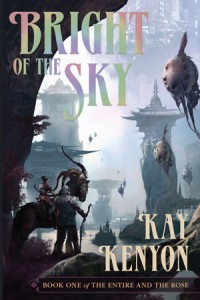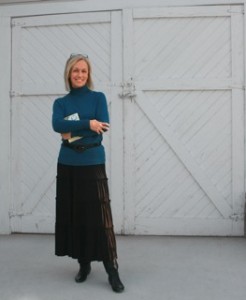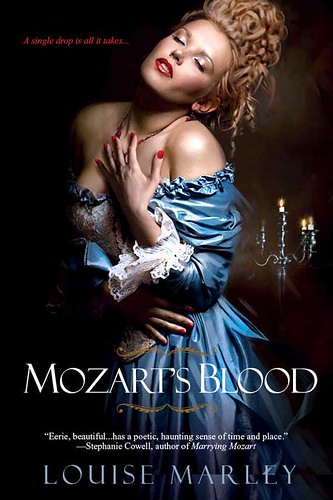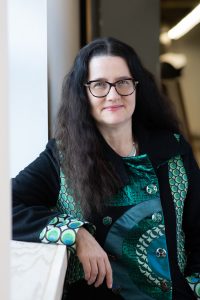 Kay Kenyon sold her first novel, The Seeds of Time, in 1997 and followed it with six stand-alone novels (including Maximum Ice and The Braided World, which I reviewed for Locus), before embarking on the four-part sci-fantasy series The Entire and The Rose.
Kay Kenyon sold her first novel, The Seeds of Time, in 1997 and followed it with six stand-alone novels (including Maximum Ice and The Braided World, which I reviewed for Locus), before embarking on the four-part sci-fantasy series The Entire and The Rose.
The latest installment in this series, Prince of Storms, was released in trade paperback July 1st. The lead title, Bright of the Sky, was one of Publishers Weekly’s top books of 2007. The series has twice been shortlisted for the American Library Association Reading List awards. Kay will sign books with Louise Marley at U Book Store in Seattle on August 5.
I began by asking Kay to tell us something about herself and this series:
I write novels. I am on my 12 or 13th novel. Funny how you always think you’ll know how many you’ve got, but after awhile they blur. I am a compulsive writer. I don’t know if I’m a writer because I’m compulsive or the other way around.
In an effort to have a more normal life (marriage and housekeeping for a large, awfully picky cat still doesn’t do it) I started a writing conference and organization, and I pour a lot of energy into that. Write on the River is a May literary conference and year-round writers’ organization for Eastern Washington. It gets me away from the keyboard and helps me connect with real carbon-based units. Other than these things, I play golf, keep a fanatical rose garden (don’t ask) and raise asparagus and raspberries and assorted edibles.
Most recently, I have written a series called The Entire and The Rose. It’s about two universes, one of which thinks it’s the only one (thus “the Entire”). The other–ours–is named after a flower.
I call the series sci-fantasy because it is science fiction with a fantasy feel. The universe where most of the action takes place has a seamless interface between advanced technology and the natural environment, making the rules of the world appear almost magical. It is also a quest story, so that gives the series a fantasy pace and framework.
This series, a quartet of stories, has received by far the best reviews of my career. I am grateful but confused by this. Did I finally figure out what people really want to read, or did I lurch forward into some master-space where I suddenly knew how to turn a phrase and give people fever dreams? I don’t know. The last book of the series, Prince of Storms just came out in trade paper. Also, all the books so far have been Endeavour Award nominees.
I have been writing for a living almost my whole life, but not always, alas, fiction. I’ve had a bunch of jobs writing TV and radio commercials, press releases, technical documents, and newsletters. Then I hit a big decade birthday and decided that I’d wasted enough time writing technical stuff and ad copy, and asked myself if I wanted to end up at the end of my life having only written totally lame things.
So I scared myself into writing a novel. I launched immediately into the project–because honestly, how hard could it be?–and then failed to sell the thing. After that, I started to go to writers’ conferences and study with pros. My next book was The Seeds of Time, and it sold 30,000 copies, which I was told was pretty good for a newcomer. So I was a fast learner.
(Yeah, I am ducking saying how old I am. But I’ve been selling novels for almost fifteen years.)
You seldom support yourself with writing fiction. That’s the truth, as unwelcome as it may be. I’m fortunate that I don’t have to have a high-paying job anymore. My husband indulges my pursuit of stories.
I couldn’t quit writing and be happy. As I said, I am a compulsive writer. There’s a reason for the compulsion: fiction writing is a singular and amazing rush, a monumentally satisfying pleasure, the most fascinating interaction with one’s own mind and the minds of readers–who are willingly entering into your fictive creation and believing it. And I would want to sell life insurance why?
Fantasy and science fiction have always been my playground. Paranormal, a touch of horror, the usual ancillary fields also compel me. I’m so glad you didn’t ask why I write in this genre–because I’ve answered that question a hundred ways and never been totally convinced I had any idea what I was talking about.
It took me about eight years to break into publishing. I wrote that unpublishable novel that I mentioned, and then spent a few more years writing a 150,000 word novel that did sell, but only after being passed on by most of the big houses before being picked up by Bantam. My commitment to writing was fierce in those days. (These days I’m less fanatical.) Nothing was going to stop me.
I must admit that breaking in was a harrowing experience. I had almost given up hope when my agent called to announce the sale: “They want your book, and it’s a two book deal, so I hope you’re got another one.” Looking back, this must have been the most ecstatic day of my life. Eight years is a long time to wait.
I was bowled over by the generosity of other writers. I expected the world of authors to be a clique of sorts, and I ended up making deep friendships that mean the world to me. So that was a big surprise. I wasn’t in it for the people, but I might almost say that that is the main thing I got. I mean, I’ve had ferocious ups and downs career-wise, but my friendships in the industry have been steady. I also was pleasantly surprised by the relationship with my agent, Donald Maass. He has taken a strong hand in guiding my career and been a valuable collaborator on story concepts.
A more unpleasant surprise: I didn’t expect that my novels would end up being seriously dark. My darkest stories didn’t find a wide readership. I had to look carefully at the darkness and let a little light in.
I think that those who say “you must always write what’s in your heart” are a little dreamy in their focus. Since this is a topic that often generates argument, let me explain. “Heart” is not different from “mind,” for starters. If by “heart” we mean emotional truth, well that is processed through the mind, and is naturally laced with strands of logic and experience. So there is no sacred place from which our stories spring that is other than our minds.
Once we’re off the high horse of “heart,” we can look at the issue as how much the writer should be influenced by the marketplace. I think it must be a mix. I’d argue, not so much for the marketplace (which sounds like following fads), but for writing the most entertaining story you can wrestle out of yourself. That means analyzing your premise, milieu, and plot to see if it can reach a wider audience. A little adjustment–or even a big one–can teach us to be more flexible and inventive. And our careers tend to be longer.
Now it feels like I am sailing just above the fray. That is, I’ve weathered so much, and I have come to a point of mastery that is the highest I can claim. I know that sounds conceited, but all I mean is, this is my best dance. The words spill out, the scenes flood my mind, the books blossom. Even if they don’t take the world by storm (although I think my next one will!) I am entranced, seduced, happy. Whatever happens.
Kay Kenyon can be found on the web at her official site, Writing the World, on Facebook, and, finally, on Twitter. There’s also a terrific review of Prince of Storms here.











